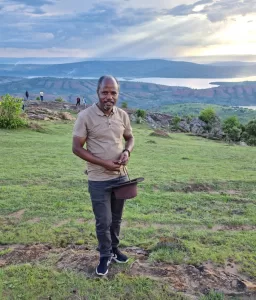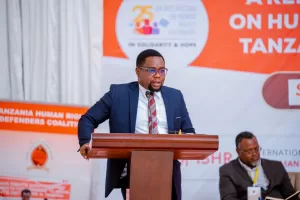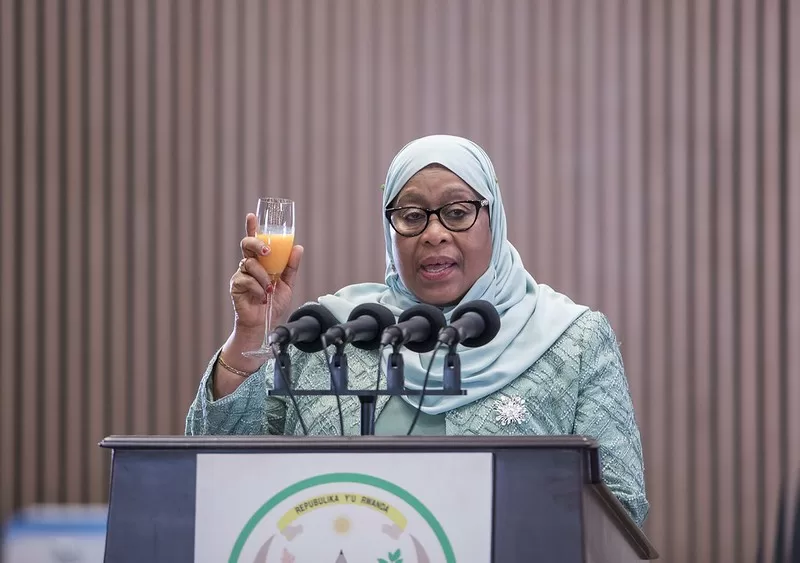10 Nov 23 | Africa, News and features, Tanzania, United Arab Emirates
When Tanzania’s President John Magufuli died in 2021, at the height of the Covid-19 pandemic, many hoped for an end to his six years of autocratic rule which saw the country’s civic space all but disappear. After Samia Hassan succeeded him, she assured the country that his authoritarian practices had died with him. Yet a crackdown on opposition to a lucrative new deal to run Dar es Salaam’s port in perpetuity and restrictions on the use of virtual private networks (VPNs) suggests otherwise.
In her inaugural policy speech after Magufuli’s death, President Hassan said: “I have heard there are media that were banned. Reopen them, we should not give them room to say we are shrinking press freedom. We should not ban the media by force. Reopen them, and we should ensure they follow the rules.”

Tanzanian journalist Ansbert Ngurumo fled to Sweden in 2017
One of those who heard Hassan’s promises was the Tanzanian journalist Ansbert Ngurumo (left), who had fled Tanzania in 2017 after getting tipped off that hitmen with orders from Magufuli to kill him had checked into the hotel where he was staying.
Speaking to Index from exile in Sweden, he said: “Journalism became a crime under Magufuli”
The omens looked good after Magufuli’s death. After being sworn into office, President Hassan, the newly celebrated “champion” of freedom of expression, seemed to act promptly on her promises. Human rights organisations, who had had their bank accounts frozen, were once again able to regain access. Onesmo Olengurumwa, director of the Human Rights Defenders Coalition of Tanzania, saw the accounts of his organisation released shortly after her announcement.
Media Council Tanzania reported a decrease in cases of arrests and harassment against journalists. It recorded 18 violations in 2022, down from 25 in 2021 and 41 in 2020. In January 2023, Hassan lifted a ban on opposition party rallies.
Yet Ngurumo says Hassan’s speech was disingenuous. “She was insisting that she was the champion of freedom of expression and free speech, whilst in the same breath putting barriers and limits to those same freedoms. Her freedom of expression is ’you scratch my back, I’ll scratch yours’ That is not freedom of expression.”
The early optimism which followed Hassan’s rise to power was short-lived. Although the number of reported cases against journalists has decreased since Magufuli’s death, suspensions, arrests, and harassment remain commonplace.
In fact, the ghost of Magufuli still hangs over civic space in Tanzania and journalists still feel the weight of the legislation passed and enforced during Magufuli’s presidency. Laws like the 2015 Cybercrimes Act, the 2016 Media Act, and the 2018 Online Content Regulations continue to restrict freedom of expression, and create an environment of fear and self-censorship.
According to Ngurumo, “Magufuli had instilled a sense of brutality in the state organs. That spirit of brutality didn’t die with him.”
More recently, Tanzanian authorities have arrested over 20 activists protesting the most recent deal to manage Dar Es Salaam’s largest port, according to Human Rights Watch. The authorities later arrested three lawyers for holding press conferences on the port deal. Boniface Mwabukusi, Willibrod Slaa and Mdude Nyagali were held on allegations of treason before being released four days later.
The controversial deal will see Dubai Port World, a UAE-based logistics company, take over the management of Tanzania’s largest port in Dar Es Salaam. Critics are concerned by the nature of the deal, which sees DP World gain the right to manage the ports in perpetuity, whilst restricting Tanzania’s ability to change conditions of the contract.
Opposition to the DP deal has been stamped out of Tanzanian media. This most recent crackdown puts Hassan’s promises in a questionable light. Old authoritarian practices have quickly come back to haunt Tanzania at the first real threat to Hassan’s leadership.
For Ngurumo, this was just another sinister message to journalists and activists in Tanzania: “These guys were held but they were released. You see, they are just threats to remind them that the government can still do something.”
Those threats seem to be working. Under constant fear and pressure, mainstream Tanzanian media still shies away from criticising the government.

Onesmo Olengurumwa of the Human Rights Defenders Coalition of Tanzania feels that opponents to a deal for Dubai Ports World to take over Dar Es Salaam’s port fear speaking out
Olengurumwa (right) argues that publications “have that hangover and feel like they will be treated as they were under Magufuli if they speak up. So they choose to remain silent, especially the mainstream media”.
From Sweden, Ngurumo still regularly writes about Tanzanian politics in his online newspaper Sauti Kubwa which means “loud voice” in Swahili. He knows that his colleagues in the country do not have the luxury of distance.
“Right now, I don’t see media in Tanzania doing their job. I do not blame them because the laws are still very repressive.”
Ngurumo still believes there is a way out: “If one thing should be done it should be amending the existing laws. We are only afraid of the laws. If we had the right laws, we would just do our job.”
Tanzania’s civic space might be at the mercy of the fickle “goodwill” of their new President, but human rights activists like Ngurumo and Olengurumwa are working hard to restore freedom of expression in their country.
Ngurumo still advocates for engagement with the government from exile. “There is back and forth. We don’t want to have to wait until there is another president.”
In their eyes, change can only happen through engagement with the government and community empowerment. Both are part of organisations pushing for the amendment of the Magufuli laws. Olengurumwa added that “if people can see that our constitution is changing and that laws are being revised, then that will also give them the confidence in our civic space.”
Their fight to reclaim civic space after decades of authoritarianism will be hard fought. On 13 October 2023, the Tanzanian Communication Regulatory Authority issued a statement restricting the use of virtual private networks in the country, much to the dismay of human rights organisations.
In their statement, the Tanzania Digital Rights Coalition condemned the move and argued that it corresponded to “curbing freedom of expression and restricting access to unbiased information.”
It seems authoritarian habits die hard. But if President Hassan is serious about her intentions to restore civic space in Tanzania, it is only by breaking down repressive legislation and building the protection of freedom of expression into the constitution that old ghosts can finally be laid to rest.

Tanzania’s president Samia Suluhu Hassan in 2021. Photo: Paul Kagame, CC BY-NC-ND 2.0 DEED
14 Sep 23 | News and features, United Kingdom, United States
Julian Assange’s fight against extradition to the USA is entering its final stages. Speaking to Index on Censorship, Assange’s wife Stella says that “this really is the endgame”.
Her concern that time is running out follows the June decision by British High Court judge Jonathan Swift that her husband’s case should not be allowed to go to appeal, a decision she calls extraordinary.
The USA has been seeking to extradite Assange, the founder of WikiLeaks, to face charges relating to the leaking of hundreds of thousands of documents to international media in 2010 and 2011 about the Afghanistan and Iraq wars, detainees in Guantanamo Bay and diplomatic cables. The documents had been sent to him by the US army whistleblower Chelsea Manning.
The story took a new twist when Assange, an Australian citizen, entered the Ecuadorian embassy in London in 2012 to avoid extradition to Sweden to face rape and sexual assault allegations. Ecuador’s then president Rafael Correa granted him asylum. The Swedish cases were eventually dropped. In 2019, Assange was evicted by the Ecuadorian government.
It has since been revealed that Assange was illegally monitored while in the embassy and that senior CIA officials in the Trump administration discussed options to kidnap and even assassinate Assange.
After Assange’s arrest on leaving the embassy, purportedly for breaching his bail conditions, the US government began extradition proceedings.
In January 2021, district judge Vanessa Baraitser ruled against his extradition on the grounds that “the mental condition of Mr. Assange is such that it would be oppressive to extradite him to the United States of America,” a decision that the US government appealed. That December 2021, the High Court ruled that Assange could be extradited after US authorities made assurances over how he would be treated in prison. In June 2022, the UK’s then home secretary Priti Patel approved the extradition.
Assange appealed to the High Court but Swift turned down the appeals saying it was “no more than an attempt to re-run the extensive arguments made to and rejected by the district judge”.
“Julian has only one option left now which is to ask two Court of Appeal judges to reconsider Swift’s decision,” said Stella Assange. “The good news, if you can call it that, is that this time the decision will not be issued behind closed doors. There will be a public hearing. If the two judges affirm Swift’s position, Julian will not be able to go to the Supreme Court. It will be the end of the road in the UK.”
The date of the public hearing is likely to be announced this week.
With time running out, Assange’s supporters have launched the Day X campaign to encourage supporters to protest at the hearing.
“On Day X, I am asking everyone who can to come to the High Court to support not only Julian but also press freedom and the public’s right to receive truthful information, which are being trampled on,” said Stella Assange.
If he is extradited, Assange faces charges under the Espionage Act, for which there is no public interest defence.
“The outcome is a foregone conclusion, particularly as the US has already argued before the British extradition judge that Julian will not ‘enjoy’ Constitutional protections for free speech under the First Amendment because he is not a US citizen and he was not in the US at the time of the receipt and publication of the information,” said Stella Assange.
Meanwhile, the Australian government is ramping up its efforts to get the US government to drop the extradition request. The current Australian government opposes his imprisonment, often citing the four and a half years he has been imprisoned to date without conviction. This week, it was revealed that 63 members of Australia’s House of Representatives and Senate had called on the US government to drop the extradition request. In a letter of support, the politicians said they were “resolutely of the view that the prosecution and incarceration of the Australian citizen Julian Assange must end”.
“Other Australian lawmakers cite the fact that he is accused of nothing other than acts of press freedom that are being recast as crimes (receiving, possessing and communicating information to the public). They also highlight that the source of said information, Chelsea Manning, is free whereas the publisher, Julian, remains imprisoned. There is a disconnect that sits very badly with the Australian temperament, where fairness matters a great deal,” said Stella Assange.
The US Ambassador to Australia Caroline Kennedy has made comments on Assange’s case which have led to speculation that there may be scope for a plea deal. If so, this would be announced when the country’s Prime Minister Anthony Albanese makes an official visit to the USA in late October. Some are suggesting that the comments may have been made to placate the Australian public, who are strongly supportive of the campaign to drop the extradition request.
“No offer has been made by the United States. Julian has won awards for his extraordinary contribution to journalism so if the United States government considers journalism to be a crime then he is guilty and has many more press and integrity awards to show it,” said Stella Assange.
With the US elections on the horizon, the window of opportunity is closing for Julian Assange and his supporters
“Under Biden, under the guise of continuing an initiated indictment, the administration has reached a new catastrophic low by creating a new normal by failing to undo the political prosecution of the previous administration and keeping a journalist imprisoned for years and years. Julian’s role in exposing corrupt and illegal practices committed by his jailers has lowered the bar for political prosecutions targeting the press the world over. There simply is no moral high ground anymore,” said Stella Assange.
She argues that her husband’s situation is used as justification by authoritarian regimes that imprison journalists.
“It is undeniable that the intrinsics of Julian’s case are so shocking it is something one would expect from the worst dictatorships. A thin patina of ‘process’ cannot obscure the fact that he is facing 175 years for groundbreaking journalism, that the only agencies who will decide on the conditions and degree of isolation that he will be held in if he is sent to a US prison, pre- and post-trial, are the same agencies that were elaborating plans to kill him while he had political asylum at the embassy, that is to say, the CIA,“ she said.
Despite the road rapidly running out, Stella Assange still feels that her husband can avoid extradition. She said:
“The fact that this is a political case gives me hope that individual agency, on the streets, through press freedom groups and those who have the ear and the conscience of those in power, will come together to end this. Julian needs to come home and all that needs to happen is for people to individually and collectively live up to our principles. A society cannot be free, open and democratic without a free press, and press freedom is incompatible with imprisoning Julian Assange.”



